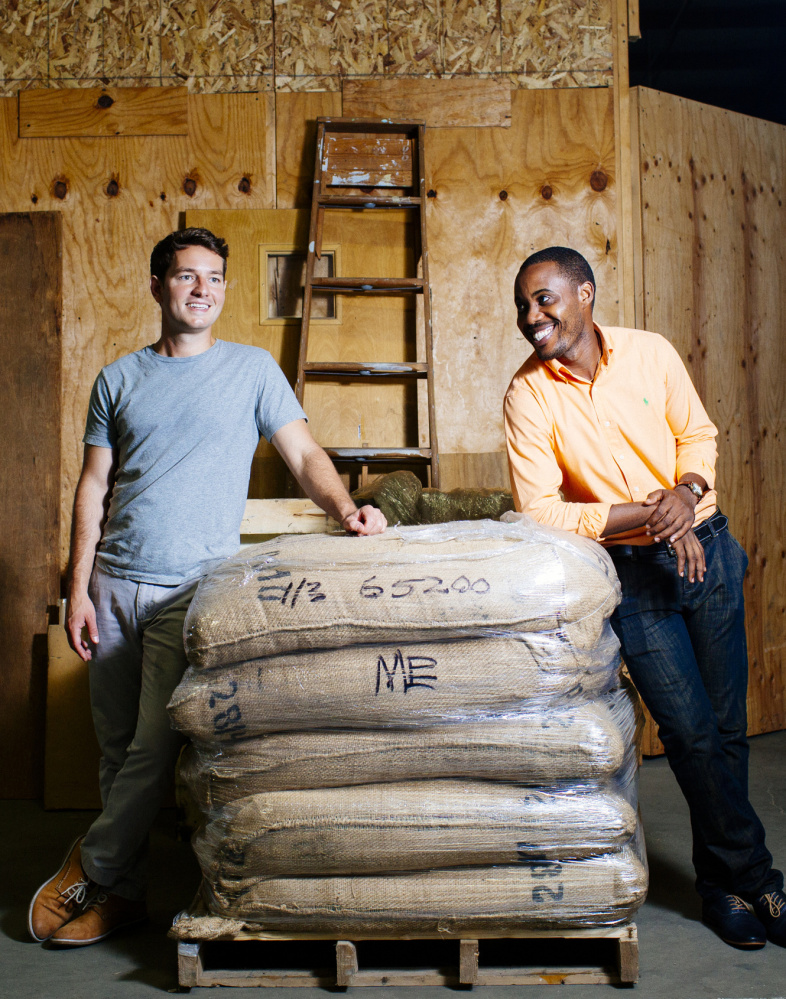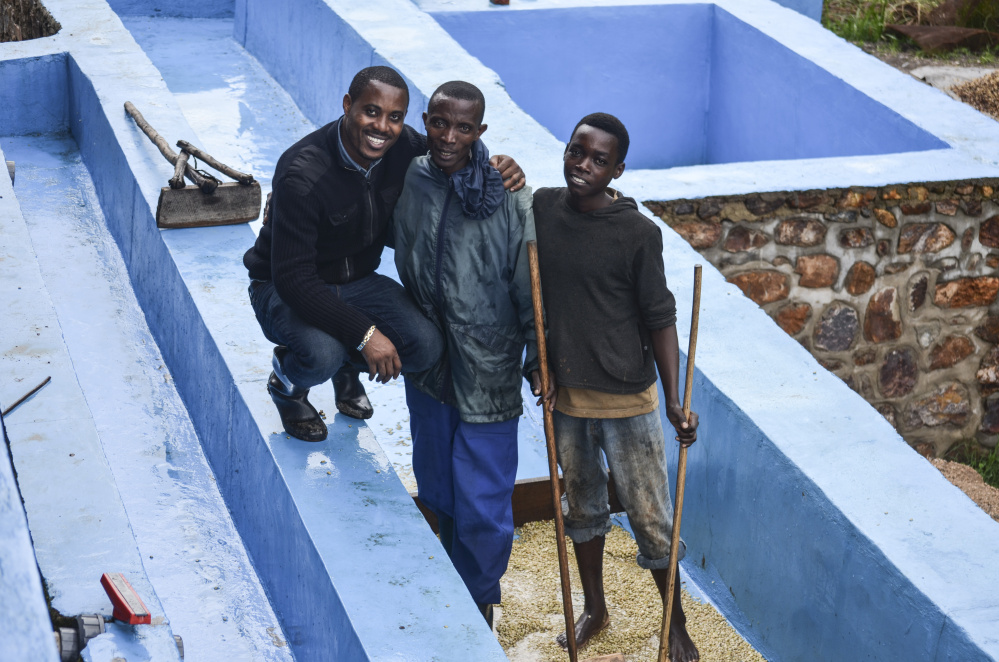In a cavernous warehouse on Presumpscot Street in Portland’s East Deering neighborhood, Mike Mwenedata and his friend and business partner, Nick Mazuroski, each grab an end of a 130-pound burlap sack.
“Three, two, one,” they say in unison, as they hoist the bulky sack filled with raw coffee beans off the concrete floor. They carry it outside and plop it in the back of Mwenedata’s Toyota.
It’s time to make a delivery.
Mwenedata, 30, and Mazuroski, 28, are the founders of the year-old Rwanda Bean Co., a coffee bean wholesaler. They’re also philanthropists. Or at least that’s the plan.
By buying coffee beans directly from a farmer’s cooperative in the western Rwandan province of Karora, they cut out the middleman coffee broker and pay the farmers more. But their commitment to giving back doesn’t stop there.
They’ve pledged to return 50 percent of the company’s profits to the farming community to support local schools, health care and clean water.
For Mwenedata, the determination to help others, especially children, was born out of heartache and unimaginable loss.
On a late summer afternoon, he sits in the lobby of an office building and hikes his neatly pressed pant leg up to the middle of his left calf. Scars crisscross his shin and ankle.
“This is where (the shrapnel) hit me,” he says, his voice barely above a whisper.
Mwenedata was 9 years old when he and his family were trapped in the frenzy of violence during the genocide in Rwanda in 1994.
They had fled to a nearby church seeking safe haven when gunmen stormed the building and began shooting. One of the attackers threw a grenade into the crowd. His mother, a brain surgeon, his father, a businessman, three of his brothers and two sisters were killed.
Mwenedata says the only reason he survived was that bodies fell on top of him, concealing the fact that he was injured but alive.
His family was among an estimated 800,000 men, women and children who were slaughtered in a three-month period. After wandering the streets for days, terrified and alone, he ended up in a refugee camp and, eventually, an orphanage.
In 2009, he immigrated to the United States, settling first in Boston and then moving to Maine to go to school at the University of Southern Maine. He arrived here with a suitcase and a sense of purpose.
“By losing my family (I knew) the only thing that would bring happiness to me was to help someone. My family liked to help people,” he says. “If (I) do good for someone it makes me feel like (my family) is proud of me and that gives me strength.”
He zeroed in on a plan that would combine his interest in business with the desire to make even a small difference in the lives of children in his native country. He shared his idea with Mazuroski.
The two met in 2013 at a Portland gym where Mazuroski’s fiancée works, and they hit it off immediately.
“He got talking about what he was really passionate about,” says Mazuroski, a Portland native with a background in food services. “Fundamentally helping people.”
Mazuroski says what appeals to him about their business model is that the Rwandan farmers are essentially stakeholders in the company.
“What drives me is equitably compensating the farmers. They … harvest the beans, wash them, bring the product to market, and (consumers) spend $3 for a cup and have no idea how much work and energy it takes to get that coffee.”
The two entrepreneurs got a boost when they won a first-place award at Maine Startup & Create week in 2014.
“That … gave us the confidence that the idea resonated with a wider audience,” Mazuroski says. “That it was something we could grow.”
In the past year, they’ve imported 4,000 pounds of coffee. This fall, they expect to purchase about 40,000 pounds for wholesale and for a line of roasted beans they’re now selling on-line.
Cathy Walsh, the owner of Arabica Coffee Co. in Portland, is their first steady customer.
“I guess what I was most excited about was to have that direct link to (Rwanda),” Walsh says. “Mike has made a vow to help the children, and I respect that and very much would like to support him.”
It helps, she says, that their coffee is delicious.
Both Mwenedata and Mazuroski know it will be a while before they can make a significant contribution to the farm families in Rwanda.
“We really have to go national,” Mazuroski says, “to have the kind of impact we want to have.”
But it’s a start. And for Mwenedata, that’s what matters most.
“I used to not have hope. Now I have hope,” he says. “Maybe some day I can take my children back (to Rwanda) and say, ‘This is where I’m from. … This is where I made a difference.’ “
Send questions/comments to the editors.




Comments are no longer available on this story